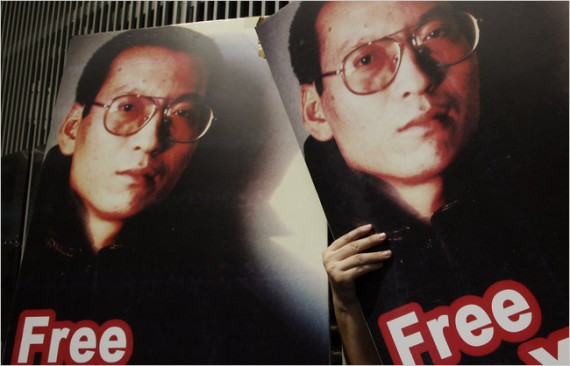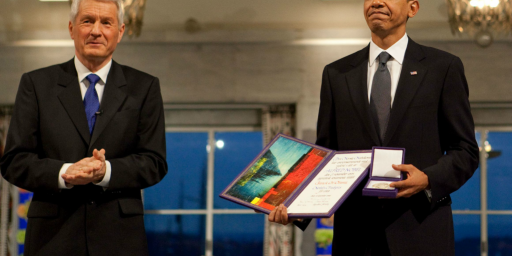Nobel Peace Prize Awarded To Jailed Chinese Dissident
Chinese dissident Liu Xiaobo has won the 2010 Nobel Peace Prize. He probably doesn't know it, though, because he's currently sitting in a Chinese prison.
After annoying pretty much everyone last year by awarding an unearned prize to a President who had not even been in office a year, this year the Nobel Committee went out of its way to make sure to make a statement with the Nobel Peace Prize:
BEIJING — Liu Xiaobo, an impassioned literary critic, political essayist and democracy advocate repeatedly jailed by the Chinese government for his writings, has won the 2010 Nobel Peace Prize in recognition of “his long and non-violent struggle for fundamental human rights in China.”
Mr. Liu, 54, perhaps China’s best-known dissident, is currently serving an 11-year prison term on subversion charges.
He is the first Chinese citizen to win the Peace Prize and one of three people to have received it while incarcerated.
By awarding the prize to Mr. Liu, the Norwegian Nobel Committee provided an unmistakable rebuke to Beijing’s authoritarian leaders at a time of growing intolerance for domestic dissent and a spreading unease internationally over the muscular diplomacy that has accompanied China’s economic rise.
In a move that in retrospect appears to have been counterproductive, a senior Chinese official had warned the Norwegian committee’s secretary that giving the prize to Mr. Liu would adversely impact relations between the two countries.
In announcing the prize on Friday, the committee noted that China, now the world’s second biggest economy, should be commended for lifting hundreds of millions of people out of poverty. But it chastised the government for ignoring basic rights guaranteed by the Chinese Constitution and the international conventions to which Beijing is a party. “In practice, these freedoms have proved to be distinctly curtailed for China’s citizens,” the committee said, adding, “China’s new status must entail increased responsibility.”
The Chinese Foreign Ministry reacted angrily to the news, calling it a “desecration” of the Peace Prize and saying it would harm Norwegian-Chinese relations. “The Nobel Committee giving the Peace Prize to such a person runs completely contrary to the aims of the prize,” Ma Zhaoxu, a spokesman said in a statement posted on the ministry’s Web site. “Liu Xiaobo is a criminal who has been sentenced by Chinese judicial departments for violating Chinese law.”
Headlines about the award were nowhere to be found in the state media or on the country’s main Internet portals. A CNN broadcast about Mr. Liu was blacked out throughout the evening. Mobile phone users reported not being able to transmit text messages containing his name in Chinese.
But on popular microblogs like Sina.com, which regularly blocks searches for his name, the news generated nearly 6,000 comments within an hour of the announcement.
No doubt because Liu has been at the forefront of the underground Chinese dissident movement for decades:
After graduating from the Chinese department at Jilin University, Mr. Liu enrolled at Beijing Normal University, where he was first a doctoral student and then a teacher. It was during the mid-1980s that he burst to fame for rousing lectures and incisive works of literary criticism that demanded an honest reckoning of the historical excesses under Mao. His writings were so bracing that school officials nearly denied him his doctoral degree.
In 1988, he left China for a series of speaking engagements in Norway, Hawaii and New York. It was in the spring of 1989, while a visiting scholar at Columbia University, that thousands of students began occupying the ceremonial heart of the nation with their calls for democracy and an end to official corruption.
Mr. Liu later said he hesitated — he almost turned back during a change of planes in Tokyo — but returned to Beijing that May as demonstrations spread across the country, paralyzing the leadership in Beijing.
In early June, as it became apparent the military would clear the square by force, Mr. Liu and three other well-known intellectuals staged a 72-hour hunger strike as a show of solidarity that he later said was necessary to earn their trust as the movement lurched toward violent end. In the early morning hours of June 4, as the army closed in, the men pried a stolen rifle from the hands of a distraught student and negotiated with military commissars to allow the protesters to safely leave the square.
Over the next few days as the crackdown began in earnest and many protest organizers fled China, Mr. Liu was arrested and later castigated in the state press as a traitorous “black hand” who had helped orchestrate what the government termed a counter-revolutionary rebellion.
After his release in 1991, Mr. Liu was stripped of his teaching job but he continued to gather petitions pressing for democracy, human rights and the reassessment of the government’s verdict on the Tiananmen protests. In 1995, his persistence brought another 8-month detention and in 1996, he was sentenced to three years in a labor camp for a series of essays that criticized the government and called for an end to official corruption.
In those days, Mr. Liu bicycled across the city to the compounds where foreigners worked and lived to fax off his writings to overseas journals.
Zhang Zuhua, a former Communist Youth League member who later played a pivotal role in drafting Charter ’08, said Mr. Liu was solitary advocate in the 1990s, when fear, exile and the pursuit of self-enrichment silenced most Chinese intellectuals. “While others were researching the same problems from a theoretical or policy standpoint, he was actively protesting and actually doing things,” Mr. Zhang said.
When he emerged from prison in 1999, the Internet had taken hold in China and was beginning to transform the nature of public discourse. At first reluctant to use a computer, Mr. Liu quickly became a prolific commentator on overseas Web sites, later calling the Internet “God’s gift to China.” Over the years, he published more than 1,000 articles.
Charter ’08 was in some ways was a culmination of Mr. Liu’s search for pragmatic ways to push for political reform in China. Although he initially heeded his wife’s pleas to stay away from drafting the manifesto, he later immersed himself in the three-year project, revising it numerous times and working to convince more than 300 people — intellectuals, workers and party members – to add their names.
In its brief life on the Internet, before it was pulled down by the censors, the petition gathered some 10,000 signatures.
Given his imprisonment, it seems doubtful that Liu will be able to appear in Oslo in December to receive the prize, or speak to the gathered delegates. Much like 1975 Nobel laureate Andrei Sakharov, he will likely be barred from leaving China.
Nonetheless, for as absurd as the Nobel Committee was last year, this was a well-deserved award.







“Nonetheless, for as absurd as the Nobel Committee was last year, this was a well-deserved award.”
And we hear…. nothing from the chattering masses.
Surprised? Not me.